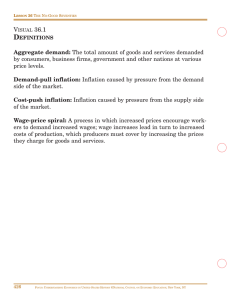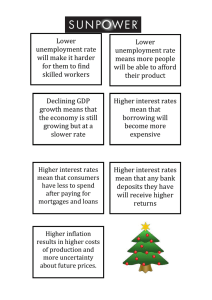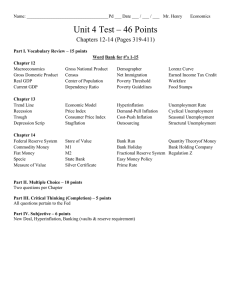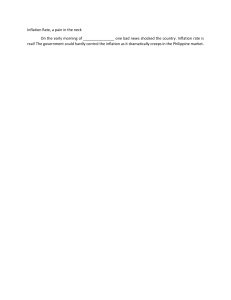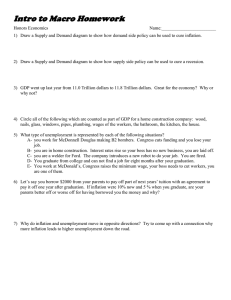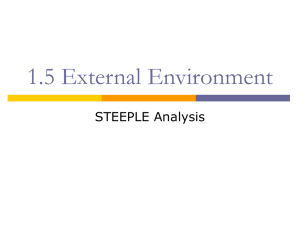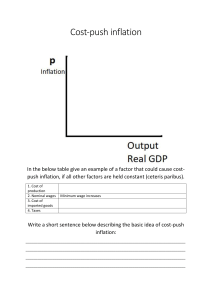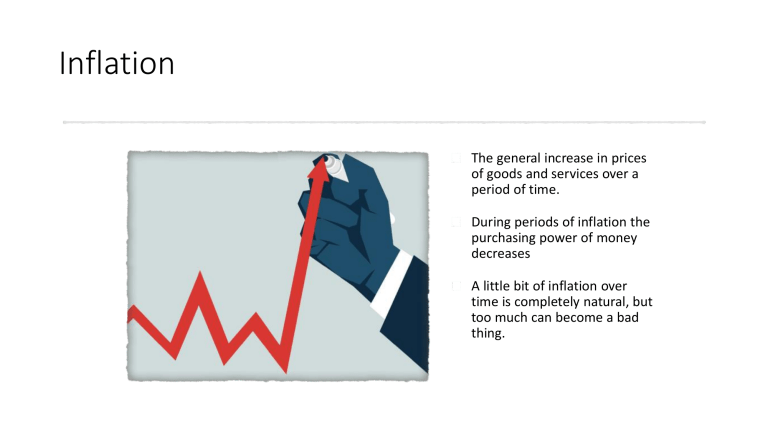
Inflation The general increase in prices of goods and services over a period of time. During periods of inflation the purchasing power of money decreases A little bit of inflation over time is completely natural, but too much can become a bad thing. Deflation A decrease in the general level of prices over time. In periods of deflation, the purchasing power of money rises Causes of Deflation Continued • 1. Decrease in Money Supply • For example:A central bank may use a tighter monetary policy by increasing interest rates. Thus, people, instead of spending their money immediately, will prefer to save them. In addition, increasing interest rates will lead to higher borrowing costs, which will also discourage spending in the economy. • 2. A unnatural spike in economic activity which greatly increases the purchasing power of consumers. • For example: A small city known for mining coal finds 1000s of pounds of diamonds. Knowing that the company is rich, the workers fight for a significantly higher wage. The purchasing power of the community has increased. Unemployment Effects When demand for a product or service decreases, a business or corporation must Downsize: this means that they must decrease production and supply to suit the lower demand. This means that the company must Layoff workers. A Layoff occurs when an organization can no longer justify paying an employee for their work. The worker loses their job(for no fault of their own) Brainstorm: How does unemployment affect our economy as a whole? How does is affect society as a whole? Unemployment Effects When individuals lose their jobs, those that remain must pick up the slack. Although corporations may show some profits during these times, it often comes from employee cuts or reduced wages for those who remain. Unemployed people lose purchasing power which is the value of currency expressed in the amount of goods and services you're able to purchase Unemployment Effects Protectionism (opposite of free trade) and severe restrictions on immigration happen with high levels of unemployment. Less volunteering and higher crime. Elevated crime makes sense because absent a wage-paying job people may turn to crime to meet their economic needs or simply to alleviate boredom. Unemployment leads to higher payments from state and federal governments for unemployment benefits as well as food assistance, and Medicaid. Unemployment Effects Lower taxation amounts Governments become nervous about the consequences of inflation, but unemployment is likewise a serious issue. Worse still, some of the worst effects of unemployment are both subtle and very long-lasting consumer and business confidence are key to economic recoveries and workers must feel confident in their future to invest in developing the skills that the economy needs to grow in the future. Types of Inflation Cost-Push Inflation • Cost-push inflation occurs when overall prices increase (inflation) due to increases in the cost of wages and raw materials. • Cost-push inflation can occur when higher costs of production decrease the aggregate supply (the amount of total production) in the economy. • Since the demand for goods hasn't changed, the price increases from production are passed onto consumers creating cost-push inflation. Example • in early 1970s, the Organization of Petroleum Exporting Counties (OPEC) took steps to decrease global oil supply. During the period there was no extraordinary increase in the volume of consumption, but the prices still surged. What sort of inflation this most likely is? • Prices of most products increased, because almost all production in some way involves oil. Demand-Pull Inflation Demand Pull Inflation Demand-pull inflation results from strong consumer demand. Many individuals purchasing the same good will cause the price to increase. when such an event happens to a whole economy for all types of goods, it is called demand-pull inflation. • demand-pull inflation is a result of too many dollars chasing too few goods.
